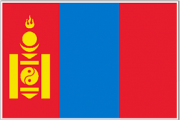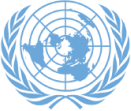STATEMENT BY MR. GANBOLD GONCHIG,
DIRECTOR OF DEPARTMENT FOR INTERNATIONAL ORGANIZATIONS,
MINISTRY OF FOREIGN AFFAIRS OF MONGOLIA
At General debate of Sixth Committee
of the 69th session of the General Assembly
9 October 2014
Mr. Chairman,
Excellences
Ladies and gentlemen,
At the outset, I wish once more to congratulate you on your election and pledge my delegation’s full support in discharge of your important duties ahead.
My delegation reaffirms Mongolia's strong condemnation of terrorism in all its forms and manifestations, committed by whomsoever, wherever and for whatever purposes. Mongolia sees the international terrorism as a threat to international peace and security, the acts of terrorism can not never be justified under any circumstances.
The Government of Mongolia is of strong view that terrorism should not be associated with any religion, race, culture, ethnic or national group. Thus efforts by international community to eradicate terrorism require a global and coordinated response, including the promotion of the dialogue among civilizations, cultures and religions, and raising public awareness.
Mr. Chairman,
We fully support the UN Global Counter-Terrorism Strategy and its four pillars, and the efforts of the Secretary-General to implement them in an integrated manner and in all its aspects. We believe that the Strategy is a living document, which updates and regularly assesses, while maintaining balance in the implementation of its four pillars.
Mongolia is strongly emphasizes the central role of the United Nations as the appropriate framework for the coordination of counter-terrorism efforts, and the crucial role played by it system-wide, including in matters concerning technical assistance.
Mongolia is a party to the majority of international counter-terrorism instruments and is considering to accede to the remaining instruments. Mongolia has strengthened its counter-terrorism regime, notably through 2013 and 2014 legislative amendments to the Anti-Terrorism Law, the Law on Combating Money-Laundering and Terrorist Financing, the Criminal Code and the Code of Criminal Procedure.
Mongolia has made significant progress in adopting terrorist-financing legislation which criminalizes the financing of terrorism and provides a terrorist designation mechanism on the asset-freezing pursuant to resolution 1373 (2001) under a 2013 Regulation on Designation of Terrorists, Freezing of Assets of Designated Persons and Review of Frozen Assets. It was removed from the international cooperation review group (ICRG) process of the Financial Action Task Force (FATF) in June 2014.
Mongolia has established an integrated border-management system that relies on cooperation and coordination between relevant agencies, including the General Intelligence Agency, the National Police, the Customs, the Immigration service and the Border-Protection Force. Mongolia has also introduced X-ray and other screening equipment, installed radiation detectors at all major crossings. Mongolia also issues ICAO-compliant Machine-Readable Passports (MRPs) and uses an Advanced Passenger Information System for passenger targeting linked to the risk-management module of the Customs Automated Information System (CAIS), which is responsible for passenger risk-assessment and checking against watch lists.
Mongolia welcomed the visit of the Counter-Terrorism Committee Executive Directorate (CTED) to monitor Mongolia’s implementation of Security Council resolution 1373 (2001) and 1624 (2005) from 26 to 30 May 2014. Mongolia also welcomes the report on the comprehensive visit of the Counter-Terrorism Committee to Mongolia and recommendations concerning steps that Mongolia should take in order to fully implement the provisions of resolutions 1373 (2001) and 1624 (2005). Mongolia would need the required human capacity, financial resources and equipment to meet the challenges it faces and the technical assistance from CTED.
Mr. Chairman,
While fighting terrorism, it is important to safeguard human rights and fundamental freedom. Mongolia is a party to all six major United Nations human rights conventions and maintains a constructive dialogue with the United Nations human rights mechanisms. In recent years, Mongolia has taken significant steps to enhance the protection of human rights, inter alia through the establishment of the National Human Rights Commission (NHRC), which was engaged together with representatives of civil society, in the preparation of the draft criminal law and draft code on the criminal procedure. We have submitted Universal Periodic Review (UPR) to the United Nations Human Right Council. Mongolia has also taken concrete steps to address concerns expressed by the United Nations human rights mechanisms concerning the criminal justice system and measures to guarantee the independence and integrity of judiciary.
We highly commend the leading role of the United Nations in promoting the cause of counter-terrorism and stand for the strengthened position of the United Nations in combating international terrorism. My delegation would like to emphasize its support for the work of relevant UN bodies, including the United Nations Office on Drugs and Crime and United Nations Counter-Terrorism Centre, in assisting states in their implementation of the Global Strategy.
We look forward to final outcome of the work of the working group established by the Sixth committee in accordance with the General Assembly resolution 68/119 with a view that convention would fill gaps and complement the existing sectorial conventions and thus effectively strengthen the legal counter-terrorism framework as well as discussions on the item included in its agenda by Assembly resolution 54/110 concerning the question of convening a high-level conference under the auspices of the United Nations.
Mongolia is willing to contribute to enhancement of international cooperation on combating, preventing and deterring terrorism through implementation of projects and programs at regional and sub-regional levels taking into account special needs of countries in disadvantageous position as well as through provision of technical assistance to developing countries on strengthening the capacity of their law enforcement authorities, therefore Mongolia enjoys close cooperation with Organization for Security and Co-operation in Europe (OSCE), Comprehensive Nuclear-Test-Ban Treaty Organization (CTBTO), the Organization for the Prohibition of Chemical Weapons (OPCW) and organized several trainings in the past years.
My Delegation takes note on the work of the Security Council Sanctions Committees and its efforts taken towards freezing of assets and blocking the financial transactions of the terrorist organizations and individuals, preventing the entry into or transit through territories of Member States by designated individuals.
Mr. Chairman,
In conclusion, my delegation reiterates the commitment of the Government of Mongolia to increased cooperation with the Member States in our joint endeavours for peace and security of all our peoples and effective implementation of the United Nations Global Counter-Terrorism Strategy, as well as the resolutions related to the first, second and third biennial reviews of the Strategy.
I wish to assure our strong support for a fruitful outcome of this session under your able guidance.
I thank you.


